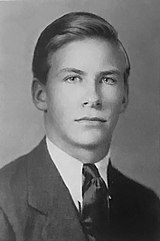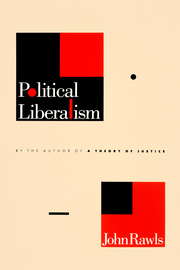John Rawls
John Rawls | |
|---|---|
Baltimore, Maryland, U.S. | |
| Died | November 24, 2002 (aged 81) Lexington, Massachusetts, U.S. |
| Education | Princeton University (BA, PhD) Christ Church, Oxford |
| Notable work | A Theory of Justice (1971) Political Liberalism (1993) |
| Spouse |
Margaret Warfield Fox
(m. 1949) |
| Awards | 21st-century philosophy |
| Region | Western philosophy |
| School | |
| Institutions | Princeton University Cornell University Harvard University |
| Thesis | |
| Doctoral advisor | Walter Terence Stace |
| Doctoral students |
|
Main interests | |
| Signature | |
John Bordley Rawls (
In 1990, Will Kymlicka wrote in his introduction to the field that "it is generally accepted that the recent rebirth of normative political philosophy began with the publication of John Rawls's A Theory of Justice in 1971".[6][7] Rawls's theory of "justice as fairness" recommends equal basic liberties, equality of opportunity, and facilitating the maximum benefit to the least advantaged members of society in any case where inequalities may occur. Rawls's argument for these principles of social justice uses a thought experiment called the "original position", in which people deliberately select what kind of society they would choose to live in if they did not know which social position they would personally occupy. In his later work Political Liberalism (1993), Rawls turned to the question of how political power could be made legitimate given reasonable disagreement about the nature of the good life.
Rawls received both the
Among contemporary political philosophers, Rawls is frequently cited by the courts of law in the United States and Canada[9] and referred to by practicing politicians in the United States and the United Kingdom. In a 2008 national survey of political theorists, based on 1,086 responses from professors at accredited, four-year colleges and universities in the United States, Rawls was voted first on the list of "Scholars Who Have Had the Greatest Impact on Political Theory in the Past 20 Years".[10]
Biography
Early life and education
Rawls was born on February 21, 1921, in
Two of his brothers died in childhood because they had contracted fatal illnesses from him. ... In 1928, the seven-year-old Rawls contracted diphtheria. His brother Bobby, younger by 20 months, visited him in his room and was fatally infected. The next winter, Rawls contracted pneumonia. Another younger brother, Tommy, caught the illness from him and died.[14]
Rawls's biographer Thomas Pogge calls the loss of the brothers the "most important events in John's childhood."

| Part of a series on | |||||||||
| Liberalism | |||||||||
|---|---|---|---|---|---|---|---|---|---|
 | |||||||||
|

